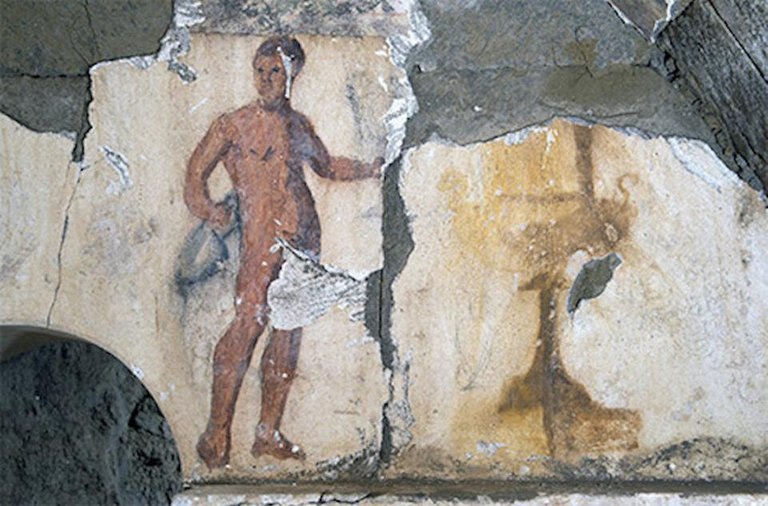A stripped man holding a wine container and a vase is only one of numerous figures portrayed in a 2,200-year-old wall painting of a feast that is improving a newfound tomb in Italy.
The painted tomb — found in the old city of Cumae — is a prize find. In any case, its style was shockingly retro at the time it was painted, between the second and third hundreds of years B.C., said the archeologists who discovered it.
In spite of the fact that a bare worker would be wrong (and amazingly strange) by the present measures, that wasn't the situation when the wall painting was painted. Amid that period and the accompanying Roman time frame, nakedness was viewed as the common condition of being, as per Haaretz, an Israeli daily paper. For example, denounced hoodlums and even female warriors were known to battle bare in Rome's Colosseum.
The city where the wall painting was found, Cumae, is situated around 15 miles (25 kilometers) west of Naples, on the Tyrrhenian Sea. Established in the second 50% of the eighth century B.C., it's viewed as the most seasoned old Greek settlement in the Western world, the archeologists said.
Since 2001, the archeologists have concentrated on a territory of Cumae that incorporated a Greek asylum, streets and a necropolis. They discovered several catacombs (little, shake cut rooms holding the expired), including a progression of vaulted internment chambers made of tuff — a volcanic stone local to the zone.
The new revelation, found in June 2018 and reported Sept. 25, incorporates a chamber with three funerary beds. Individuals entered the old tomb by utilizing an entryway in the veneer, which was fixed with an extensive stone square, the archeologists said.
Tomb pillagers appropriated the internments in the nineteenth century, yet the archeologists figured out how to locate a couple of outstanding hints of funerary ancient rarities that helped them date the chamber. The luxurious space and painting demonstrate that the general population who were covered there had a high economic wellbeing, the archeologists said.
The wall painting itself is surprising for its huge range of hues. Alternate tombs unearthed in the necropolis are enhanced paintings painted just in red or white, the archeologists said. In any case, the wall painting with the stripped worker has various hues, including dark colored and pink, painted over the white mortar foundation. A significant part of the wall painting has disintegrated throughout the years, however the meal's visitors were likely painted as an afterthought dividers of the tomb, the archeologists said.
To avert additionally rot, the archeologists selected to expel the fresco from the tomb, and painted sections they found on the ground. Afterward, they intend to reassemble the pieces like a riddle, they said.


Hello, as a member of @steemdunk you have received a free courtesy boost! Steemdunk is an automated curation platform that is easy to use and built for the community. Join us at https://steemdunk.xyz
Upvote this comment to support the bot and increase your future rewards!